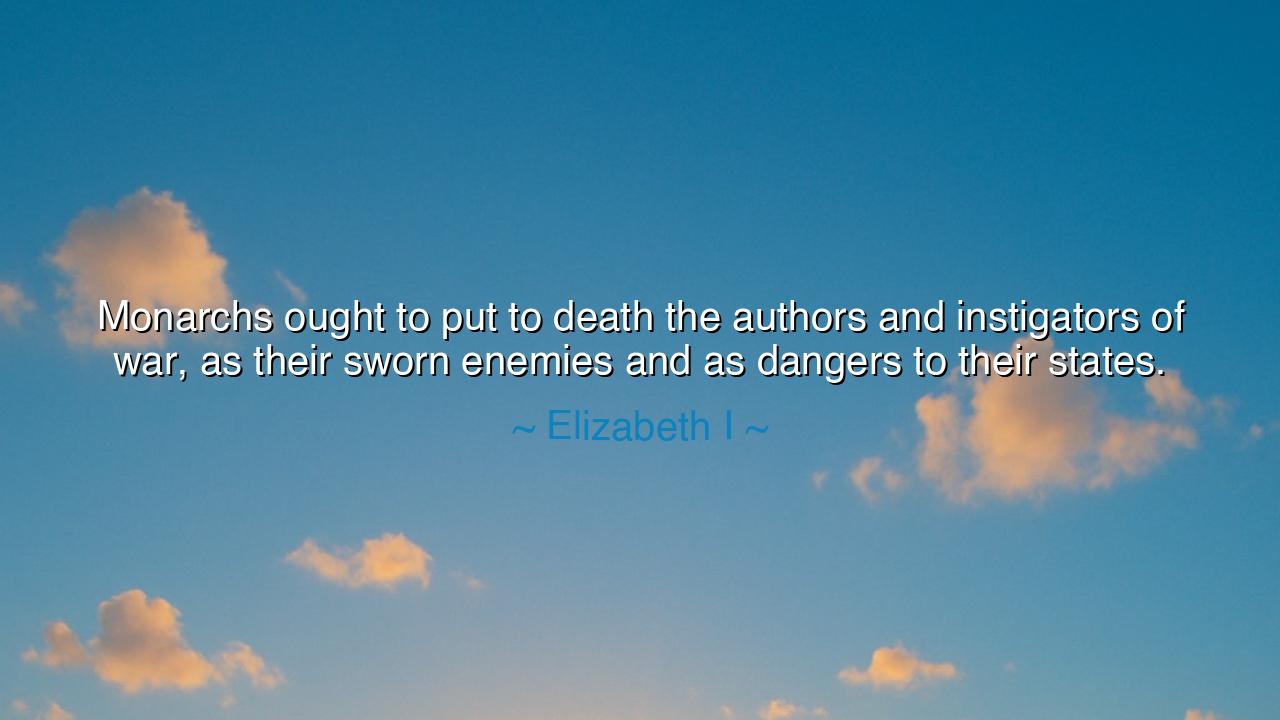
Monarchs ought to put to death the authors and instigators of
Monarchs ought to put to death the authors and instigators of war, as their sworn enemies and as dangers to their states.






“Monarchs ought to put to death the authors and instigators of war, as their sworn enemies and as dangers to their states.” So spoke Queen Elizabeth I, the Virgin Queen, sovereign of England, who ruled not only with power but with an iron mind sharpened by wisdom. Her words strike like thunder through the centuries — a judgment not merely upon kings and courtiers, but upon all who fan the flames of conflict for ambition’s sake. For Elizabeth knew, as few rulers did, that war is not always born of justice or necessity, but often of vanity, greed, and pride — and that those who stir it are the true enemies of nations.
In the age of Elizabeth, the world trembled between chaos and order. Europe was a cauldron of power and faith, and men clothed their hunger for dominion in the robes of holy cause. But Elizabeth, though no stranger to battle, sought peace above conquest. She had inherited a realm divided — Catholics against Protestants, nobles against crown — and yet she saw that war was not always the answer to unrest. The true danger, she believed, was not in the sword itself, but in the hand that urges it to strike. The instigator of war, she warned, is the serpent that whispers behind the throne, poisoning nations with deceit and false glory.
To understand her words, we must look not only at her time, but at the ages that followed. How many empires have been led to ruin by the honeyed voices of those who profited from battle? Consider the First World War, when kings and generals were swayed by advisors and nationalists who spoke of honor but cared only for power. Millions perished, and for what? The authors of war, those who conceived it in comfort and let others die in their stead, were never the ones to bleed. Elizabeth’s warning was prophetic — she saw that the true enemies of nations are not foreign invaders, but the warmongers within, those who cloak destruction in the language of duty and pride.
There is an old tale of her reign that shines like a torch of her wisdom. When her council urged her to declare war upon Spain long before the Armada, she resisted. She saw that England was not yet ready, that her people were weary, that the bloodshed would serve only those who sought glory in battle. “War,” she is said to have replied, “is easy to begin, but difficult to end.” And when war finally came, it was not of her making, but a defense of her realm. Her restraint was not weakness; it was the strength of a ruler who understood the cost of human life. In her restraint lay the mark of a true monarch — one who knew that peace is not the absence of courage, but the mastery of it.
The ancients, too, spoke in her spirit. The philosopher Heraclitus said, “War is the father of all things,” but Elizabeth would have answered, “Then may peace be their mother.” For she understood balance — that though war sometimes cannot be avoided, it must never be desired. To crave war is to be enslaved by shadow; to seek peace is to be guided by light. Thus, her words call upon all rulers — and all who lead — to guard against those who profit from division, who whisper of enemies where there are none, who inflame anger for gain.
Her wisdom extends beyond thrones and crowns. In our own lives, we are monarchs of smaller kingdoms — our homes, our hearts, our communities. And we, too, have instigators of war among us: the voices of resentment, gossip, envy, and fear. They urge us to fight where we might forgive, to destroy where we might build. Elizabeth’s counsel remains true: if you would preserve your peace, silence the warmongers within. Do not let them rule your heart.
The lesson is clear: seek peace, but do not mistake it for passivity. Be strong, but not cruel; be vigilant, but not vengeful. When the voices of division rise — in nations, in families, in your own thoughts — stand as Elizabeth did, with calm resolve and a heart that serves not ambition, but harmony. For every person who resists the call to needless war strengthens the fabric of the world. And when rulers, whether of kingdoms or of themselves, can master that art, they will leave behind not monuments of conquest, but legacies of wisdom, justice, and enduring peace.






AAdministratorAdministrator
Welcome, honored guests. Please leave a comment, we will respond soon